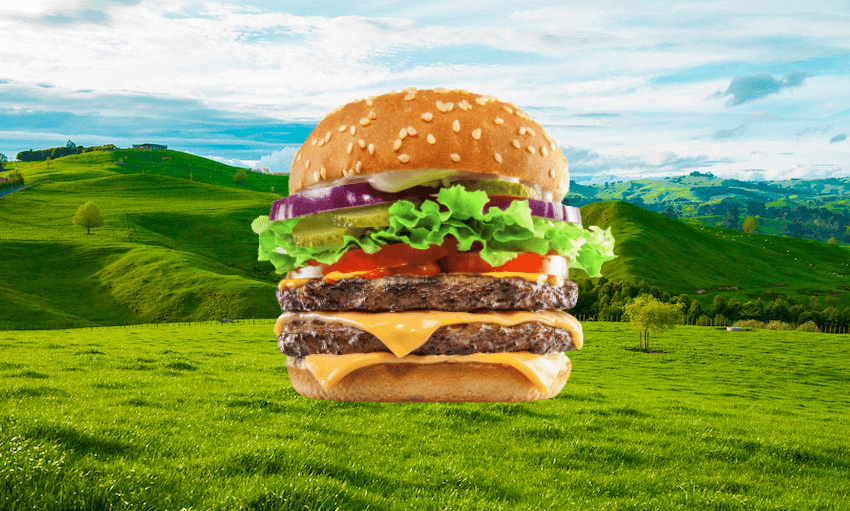A much ballyhooed report has found that New Zealand is ideally placed to create beef patties that are sustainable across the entire supply chain. Sounds good, but it’s the product of some extremely selective calculations, argues Mathias Corwin.
Earlier this month came the news that the Ministry for Primary Industries had teamed up with the meat industry (or Big Beef, as I’m calling it) to prove to the world that New Zealand can produce a sustainable beef patty. A year-long proof of concept study has just been released for public consumption and the results are both delicious and… questionable.
The trial, which used the McDonald’s supply chain as a test case, has been lauded by industry officials, farmers and MPI as a game changer, amid claims that sustainable New Zealand beef is set to become the “new normal”.
“The project showed that New Zealand can do this, and the model can be scaled up – so this really is an encouraging milestone,” Steve Penno, MPI’s director of investment programmes, said in a media release.
“It provides transparency to customers and the public in a way that hasn’t been possible before.”
Proof that New Zealand beef can be sustainable across the entire supply chain would be a coup for the sector as it competes in an export market that increasingly demands ethically sourced and sustainable products.
The study’s main claim, that “it’s possible to produce a beef patty sustainably across the supply chain in New Zealand”, is based on an independently verified audit which, according to the MPI blurb, runs through “the entire supply chain”.
It’s here that the claim starts to fall apart. Closer inspection of the report reveals that the following areas are outside of the scope of study: feedlots, sales yards, livestock transport, product transport and storage, and feed. The most concerning omission is that carbon equivalent emissions are not included as one of the metrics for judging sustainability.
I thought that this must be a mistake. Surely a sustainability study on this scale – with all the backing of MPI and Big Beef – must at least give a head nod towards climate change. When I emailed MPI for clarification, the reply came back:
“The study does not have any direct correlation with NZ’s carbon targets or industry objects by way of He Waka Eke Noa (the Primary Sector Climate Action Partnership), albeit accreditation by way of NZFAP+ (New Zealand Farm Assurance Programme) does require evidence of Farm Environment Planning.”
The 24 page report (which includes a full page photo of a Big Mac, four full page photos of cows, and six full-page “farmer profiles”) has only one mention of the word “emission” (thank you control-F). This is in a table which compares the global sustainable beef principles against the NZFAP+ standard. Somewhat surprisingly, the NZFAP+ standard does not include the minimisation of greenhouse gas emissions as one of its principles. For those wondering, NZ beef patties come with a fairly hefty carbon price. In New Zealand, which is admittedly the most sustainable producer of beef in the world, sheep and beef accounts for an estimated 47% of agricultural livestock methane emissions, which is about 16% of New Zealand’s total gross emissions.
Livestock feed, which is outside of the scope of the study, presents an interesting quandary for producing a sustainable beef patty. In order to apply the results of the study to the rest of New Zealand, farmers would need to switch to 100% grass-fed cattle. In the North Island, where droughts are becoming increasingly more common due to climate change, this presents a real challenge and farmers are currently supplementing pasture grazing with palm kernel expeller (PKE). New Zealand is the biggest single importer of PKE in the world and this is associated with a raft of environmental issues, including rainforest deforestation, biodiversity loss, import biosecurity issues and greenhouse gas emissions.
One interesting insight into the minds behind Big Beef is in where they see the rise of alternative/synthetic proteins (i.e. lab grown meat) as a risk to their industry. In a chart of stakeholder interest (which should really be renamed steakholder interest, but let’s not split hairs) vs. impacts to business, synthetic proteins are rated as the least significant of 28 identified issues. This prioritisation appears to be one hell of a gamble to make, as lab grown meats are predicted to become cheaper, significantly more sustainable and less ethically concerning than meat.
The report has been clearly tailored for farmers and puts strong emphasis on the benefits of farmers undergoing the NZFAP+ audit as a way of tracking their sustainability progress. This is a good thing, and should be commended. Where the report lets us all down (farmers included) is in the premature statement that it’s possible to produce a sustainable beef patty across the entire supply chain and that this model can be scaled up across New Zealand. This claim is simply not credible with the limits to the scope of study and the absence of any measurement of the carbon cost across the lifecycle of a beef patty.

